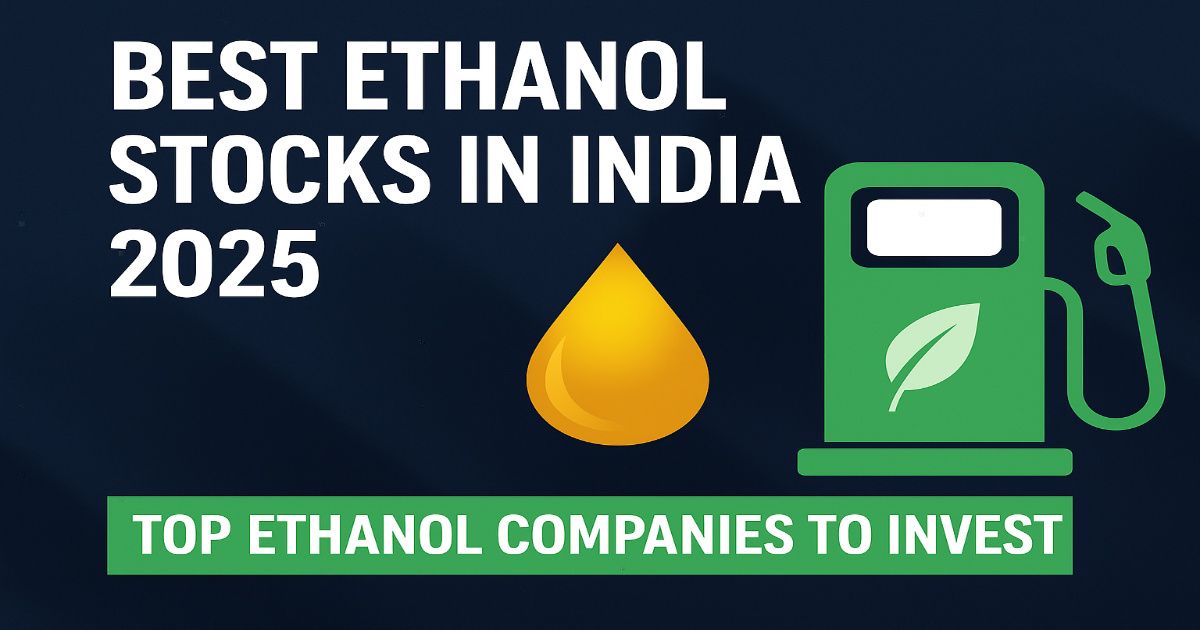India is undergoing a major energy transition. One of the most important themes in this transformation is ethanol blending with petrol. The government has been aggressively pushing this program to reduce crude oil imports, support farmers, and lower carbon emissions. This structural shift has created a multi-billion-dollar opportunity for sugar companies, distilleries, and technology providers.
What Are Ethanol Stocks?
Ethanol stocks are the shares of companies that are directly or indirectly involved in the production, supply, or technology of ethanol.
Ethanol is a type of biofuel made from renewable sources like sugarcane, molasses, and grains (corn, rice, maize, etc.). In India, ethanol is primarily blended with petrol under the Ethanol Blending Programme (EBP) to reduce crude oil imports and cut down on pollution.
So when we talk about ethanol stocks, we are referring to companies that:
- Produce ethanol directly – such as sugar mills and distilleries that convert sugarcane juice, molasses, or grains into ethanol.
- Enable ethanol production – such as engineering companies that design ethanol plants, supply technology, or set up bio-refineries.
- Diversify into ethanol – companies that were earlier only into sugar or spirits, but now have a significant ethanol capacity as an additional revenue stream.
Why Invest in Ethanol Stocks?
Investing in ethanol stocks in India has become increasingly attractive as the nation transitions toward cleaner, sustainable energy solutions. Ethanol, a biofuel produced mainly from sugarcane and grains, plays a vital role in reducing India’s dependence on costly crude oil imports. With over 80% of its crude oil requirements imported, India spends billions of dollars annually on energy. By blending ethanol with petrol, the government not only saves foreign exchange but also improves energy security.
The Indian government has set a target of achieving 20% ethanol blending (E20) by 2025–26, creating massive growth opportunities for ethanol producers. Oil Marketing Companies (OMCs) such as IOCL, BPCL, and HPCL are mandated to procure ethanol at fixed prices, ensuring a reliable demand pipeline. This policy-driven push gives ethanol companies visibility of steady revenues, something rare in other cyclical industries.
Another compelling reason to invest is the diversification benefit for sugar companies. Traditionally dependent on volatile sugar prices, many sugar mills are now expanding their ethanol production capacities. This shift provides them with a stable alternative income stream, making their earnings more resilient to market cycles.
Top Ethanol Stocks in India (2025)
India’s ethanol industry is booming, and several listed companies are at the forefront of this transformation. These companies are either directly involved in ethanol production or are expanding aggressively into the biofuel space. Here are some of the best ethanol-related stocks to watch in 2025:
1. Praj Industries Ltd.
- About: Praj Industries is a global leader in bioenergy and process engineering solutions. It is the pioneer in building ethanol plants in India and abroad.
- Why It’s a Top Pick:
- Provides turnkey solutions for ethanol manufacturing plants.
- Strong expertise in 1G and 2G ethanol technologies, making it a leader in next-gen biofuels.
- Strong balance sheet with low debt and consistent profits.
- Key Highlight: Praj is not just a sugar company but a technology provider, making it a diversified and unique ethanol play.
2. Balrampur Chini Mills Ltd.
- About: One of India’s largest integrated sugar producers, Balrampur Chini is a dominant player in ethanol production.
- Why It’s a Top Pick:
- Large-scale distillery capacity expansion underway.
- Revenue diversification from sugar to ethanol ensures steady cash flows.
- Strong operational efficiency and presence in Uttar Pradesh, India’s sugarcane hub.
- Key Highlight: Among the most efficient sugar companies, well-positioned to benefit from the ethanol blending mandate.
3. Shree Renuka Sugars Ltd.
- About: A leading sugar and ethanol producer with backing from Wilmar International (Singapore).
- Why It’s a Top Pick:
- Aggressively expanding its ethanol distillery capacity.
- Strategic backing from Wilmar ensures strong financial and operational support.
- Presence across multiple states reduces regional risks.
- Key Highlight: Strong promoter backing makes it a reliable ethanol play.
4. Triveni Engineering & Industries Ltd.
- About: A diversified conglomerate with businesses in sugar, power transmission, and ethanol.
- Why It’s a Top Pick:
- Significant investments in ethanol capacity expansion.
- Strong financial performance and low leverage.
- Diversification into engineering solutions provides extra stability.
- Key Highlight: Strong fundamentals and a balance of traditional and renewable businesses.
5. Dhampur Sugar Mills Ltd.
- About: Another major integrated sugar and ethanol producer in India.
- Why It’s a Top Pick:
- Leading producer of ethanol with expanding capacity.
- Focus on value-added products and sustainable growth.
- Consistently strong financial performance.
- Key Highlight: Well-established reputation in ethanol supply to OMCs.
How to Invest in Ethanol Stocks in India
Investors who want to tap into the ethanol growth story have several routes to gain exposure. Depending on your capital, risk appetite, and access to financial markets, here are some of the most practical ways:
1. Access Ethanol Shares Through Online Brokerages
The simplest way for retail investors to participate in India’s ethanol boom is by buying shares of listed ethanol producers and enablers directly from the stock market.
- Open a demat and trading account with an online brokerage such as Zerodha, Groww, Upstox, or ICICI Direct.
- Research ethanol-producing companies (e.g., Balrampur Chini Mills, Triveni Engineering, Shree Renuka Sugars, Praj Industries).
- Evaluate their ethanol production capacity, expansion plans, and financial health before investing.
This method is the most accessible for beginners and allows both short-term trading and long-term wealth creation.
2. Consider Direct Private Equity Participation
For high-net-worth individuals (HNIs) or institutional investors, direct private equity investments can be a way to participate in India’s ethanol ecosystem.
- This involves investing in unlisted ethanol startups or biofuel ventures that are not yet public.
- Often executed through private equity funds or venture capital firms, these investments can offer higher growth potential but also carry higher risk and lower liquidity.
- Entry barriers are high, as minimum ticket sizes can run into several crores.
Suitable only for sophisticated investors with significant capital and long investment horizons.
3. Utilise Specialised Alternative Energy ETF Offerings
Another option is exchange-traded funds (ETFs) focused on renewable or alternative energy.
- While India currently does not have a dedicated “ethanol ETF,” many global and domestic green energy ETFs include exposure to ethanol, biofuels, or renewable fuel producers.
- ETFs provide diversification by pooling multiple companies into a single basket, reducing the risk of betting on one stock.
- They are also a low-cost and liquid option for investors who prefer passive investing.
A great choice for those who want exposure to ethanol and renewable energy without picking individual stocks.
Overview of Ethanol Industry In India
The ethanol industry in India is one of the fastest-growing segments of the renewable energy space, supported strongly by government policies. Ethanol, produced mainly from sugarcane, molasses, and grains like rice and maize, is blended with petrol to reduce crude oil imports and cut carbon emissions. The Indian government has advanced its target of achieving 20% ethanol blending (E20) by 2025–26, and blending levels have already reached around 19–20% in 2025. This sector benefits farmers by creating steady demand for crops, supports energy security, and promotes cleaner fuels. With rising capacities and technological advances, the ethanol industry has become a key driver of India’s green energy transition.
Factors to Consider Before Investing in Top Ethanol Stocks in India
While ethanol stocks present a lucrative long-term investment opportunity, investors should carefully evaluate multiple factors before making a decision. The ethanol industry is highly policy-driven, capital-intensive, and closely linked to commodity cycles. Here are the key aspects to consider:
1. Financials
Always review the financial health of the company. Look into its balance sheet, debt levels, cash flow statement, promoter shareholding, and free cash flow generation. Companies with strong fundamentals and low leverage are better placed to sustain growth in a cyclical industry.
2. Valuation & Technical Indicators
Even a strong company may not be a good buy if its stock price is trading at extremely high valuations. Investors should analyze valuation ratios like P/E, EV/EBITDA, and Price-to-Book, and also study technical indicators such as moving averages, support, and resistance levels before entering a position.
3. Regulatory Issues
Sugar is among the most regulated commodities in India, and most ethanol producers are sugar mills. Changes in government regulations related to sugar pricing, sugarcane procurement, and ethanol blending targets can directly impact earnings. Staying updated on policy changes is essential.
4. Feedstock Availability
Ethanol can be produced from sugarcane juice, molasses, or grains. Companies with diversified and sustainable feedstock supply chains are less vulnerable to raw material shortages and price fluctuations, making them more stable investments.
5. Linkage with Oil Market
The fortunes of ethanol companies are closely tied to oil marketing companies (OMCs), which are the largest buyers of ethanol for blending programs. Any volatility in crude oil prices, fuel demand, or OMC procurement strategies can impact ethanol sales and profitability.
6. ESG Factors
Ethanol stocks often attract environmentally-conscious investors. Before investing, evaluate the company’s sustainability initiatives, emission reduction efforts, and governance practices. Firms with strong ESG compliance may enjoy better valuations over the long term.
7. Competition
Since OMCs procure ethanol through auctions, companies with higher efficiency and better margins are likely to win more supply contracts. Strong competitive positioning ensures consistent revenue flow compared to weaker peers.
Advantages of Investing in Ethanol Stocks
Ethanol stocks have gained strong investor interest in recent years, thanks to government support and the growing demand for renewable fuels. Here are some of the key advantages of investing in ethanol stocks in India:
1. Strong Government Support
The Indian government has set ambitious targets of achieving 20% ethanol blending (E20) by 2025–26. With policies, subsidies, and fixed procurement prices, ethanol companies enjoy predictable demand and revenue visibility.
2. Rising Energy Security
Ethanol blending helps India reduce its dependence on crude oil imports, which account for over 80% of the country’s energy needs. As demand for ethanol rises, producers benefit from long-term structural tailwinds.
3. Diversification for Sugar Companies
Sugar producers have historically been vulnerable to volatile sugar cycles. Ethanol provides them with an alternative revenue stream, reducing dependence on sugar prices and making earnings more stable.
4. Growing Demand for Green Energy
Globally, the shift toward clean and sustainable energy is accelerating. Ethanol is a renewable biofuel that appeals to environmentally-conscious investors and is aligned with India’s climate commitments.
5. Steady Revenue through OMC Contracts
Oil Marketing Companies (IOCL, BPCL, HPCL) procure ethanol at fixed government-determined prices. This creates assured offtake for ethanol producers, lowering market risk.
6. Rural and Agricultural Boost
The ethanol industry directly supports farmers by creating a steady demand for sugarcane and grains. As ethanol production expands, rural economies benefit, further reinforcing government backing for the sector.
7. Long-Term Growth Potential
With India already reaching ~19–20% blending in 2025 and moving towards full E20, ethanol companies are positioned for multi-year growth. Investors who enter early can ride this structural opportunity.
Risks of Investing in Ethanol Stocks
While ethanol stocks offer strong growth potential, they also carry certain risks that investors must consider before making a decision. Here are the major challenges in this sector:
1. Policy Dependence
The ethanol industry in India is heavily dependent on government policies. Prices of ethanol, blending targets, and sugarcane procurement rules are controlled by regulators. Any policy reversal, delay in blending targets, or unfavorable price revisions can impact company profitability.
2. Raw Material Availability
Ethanol production relies on sugarcane, molasses, and grains like maize and rice. Droughts, weak monsoons, or fluctuations in agricultural yields can affect supply. High water usage in sugarcane cultivation also makes ethanol vulnerable to climate-related risks.
3. Volatility in Oil Markets
Ethanol demand is closely tied to oil marketing companies (OMCs) that blend it with petrol. If crude oil prices fall sharply, the incentive to promote ethanol blending may reduce, impacting demand.
4. High Capital Requirements
Setting up or expanding ethanol distilleries requires large capital expenditure. Smaller or highly leveraged companies may face challenges in funding expansions or managing debt during weak cycles.
5. Commodity Price Risk
As most ethanol producers are also sugar companies, their earnings are influenced by sugar price cycles. If global sugar prices crash or cane availability falls, it can indirectly affect ethanol margins as well.
Conclusion
Ethanol stocks in India present a unique blend of growth, sustainability, and government-backed opportunities. With rising ethanol blending targets and expanding capacities, leading players are well-positioned for long-term gains. However, investors should carefully evaluate financials, regulations, and market trends before investing in this promising green energy sector.
What are ethanol stocks?
Ethanol stocks are shares of companies engaged in producing ethanol, a biofuel blended with petrol.
Why invest in ethanol stocks?
They benefit from government support, reduced oil imports, and rising demand for clean energy.
Which are the top ethanol stocks in India?
Popular names include Praj Industries, Balrampur Chini Mills, Shree Renuka Sugars, Triveni Engineering, and Bajaj Hindusthan.
What risks are involved in ethanol stocks?
Key risks include policy changes, raw material shortages, oil price volatility, and high capital expenditure.
Disclaimer
This article is for educational purposes only and should not be considered as financial or investment advice. Stock market investments are subject to risks, including loss of capital. Investors are advised to do their own research or consult a certified financial advisor before making any investment decisions.








